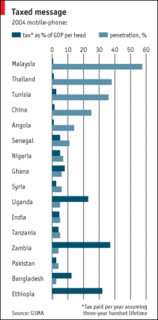
The Economist provided this graphic relating the gist of the study.
This it the report of a study conducted by Pyramid Research and Frontier Economics, with support from Deloitte & Touche LLP and Tarifica. GSM Association, 2005.
"The study’s key findings are:
1. Taxes are disproportionately high in many developing countries
- In 16 of the 50 developing countries in the study, taxes on mobile phones and services represent more than 20% of the total cost of ownership. In these 16 countries, which are home to hundreds of millions of people, the annual cost of taxes ranges from an average of US$24 to US$179 per mobile phone user.
- Nineteen countries even levy additional taxes, on top of standard sales taxes, on mobile phone users. Some of these additional taxes are telecom specific, such as service activation taxes. These special taxes average US$13 per annum per subscriber.
2. The black market in handsets is booming as users try to avoid high taxes
- 39% of all handsets sold in the 50 countries in the study in 2004 were via the black market, representing a loss of $2.7 billion in tax revenues.
3. Cutting taxes on mobile handsets and services attracts new users
- If low cost handsets were made exempt from import duties and sales taxes, up to 930 million additional low-cost handsets could be sold by 2010 in the 50 countries in the study, leading to an increase in mobile phone penetration and a rise in total tax revenues in some countries.
- If a government lowered taxes on mobile usage by just one percentage point, that could boost the number of mobile users in that country by more than 2% by 2010.
- Eliminating the special taxes could boost the numbers of mobile users in the 19 affected countries by 34 million (or 8%) by 2010.
- The removal of all sales and customs taxes on mobile handsets and services could prompt an increase in mobile penetration of up to 20 percentage points, according to an analysis by London Business School of the data in this study
4. Lower taxes mean greater revenue opportunities for governments in the long term
- Cutting taxes on handsets would attract new mobile users. If taxes on usage remained the same, each new user could yield additional service tax revenues of US$25 per year.
No comments:
Post a Comment